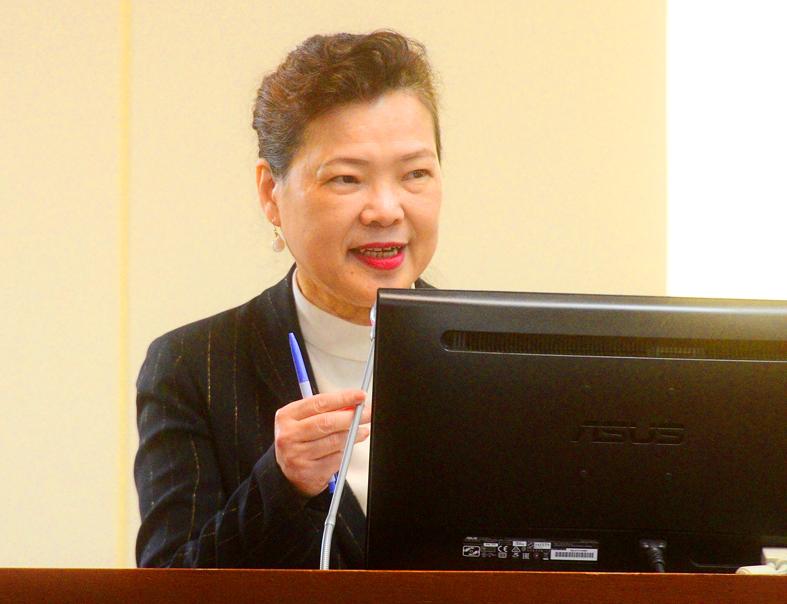The government’s energy transition plan depends on the construction of the proposed third liquified natural gas (LNG) terminal off the coast of Datan Borough (大潭) in Taoyuan’s Guanyin District (觀音) to increase LNG power generation, Minister of Economic Affairs (MOEA) Wang Mei-hua (王美花) said yesterday.
“If we do not have the third LNG terminal as planned, we will not be able to reach 50 percent electricity generation from natural gas and 30 percent electricity generation from coal” by 2025, Wang said at a meeting of the legislature’s Economics Committee in Taipei.
In December last year, 41.5 percent of Taiwan’s electricity came from coal-fired plants, 40.1 percent from natural gas, 14.4 percent from nuclear power and 5.8 percent from renewables, Bureau of Energy data showed.

Photo: Wang Yi-sung, Taipei Times
The government plans to phase out nuclear power by 2025, reduce the use of coal to 30 percent and boost renewables to 20 percent.
The two existing LNG receiving terminals are already running at full capacity, necessitating the third LNG terminal, Wang said.
Democratic Progressive Party Legislator Chiu Chih-wei (邱志偉) asked Wang whether the ministry has a backup plan if a referendum to block the terminal plan prevails.
“As of now, there is no plan B,” Wang said. “The MOEA calls for the swift construction of the third LNG terminal to reduce the amount of coal burned.”
“Gas from the third LNG terminal would fulfill the power needs of 10 million Taiwanese and close the power gap in the north of Taiwan,” Wang said. “This would allow us to generate power where it is used, lowering systemic risk.”
LNG power generation releases approximately 50 percent less greenhouse gas than coal-fired power generation, and much fewer pollutants.
The 5,824 megawatt Taichung Power Plant is the third-largest coal-fired plant in the world and is often fined by the Taichung City Government for using too much coal.

South Korea’s equity benchmark yesterday crossed a new milestone just a month after surpassing the once-unthinkable 5,000 mark as surging global memory demand powers the country’s biggest chipmakers. The KOSPI advanced as much as 2.6 percent to a record 6,123, with Samsung Electronics Co and SK Hynix Inc each gaining more than 2 percent. With the benchmark now up 45 percent this year, South Korea’s stock market capitalization has also moved past France’s, following last month’s overtaking of Germany’s. Long overlooked by foreign funds, despite being undervalued, South Korean stocks have now emerged as clear winners in the global market. The so-called “artificial intelligence

‘SEISMIC SHIFT’: The researcher forecast there would be about 1.1 billion mobile shipments this year, down from 1.26 billion the prior year and erasing years of gains The global smartphone market is expected to contract 12.9 percent this year due to the unprecedented memorychip shortage, marking “a crisis like no other,” researcher International Data Corp (IDC) said. The new forecast, a dramatic revision down from earlier estimates, gives the latest accounting of the ongoing memory crunch that is affecting every corner of the electronics industry. The demand for advanced memory to power artificial intelligence (AI) tasks has drained global supply until well into next year and jeopardizes the business model of many smartphone makers. IDC forecast about 1.1 billion mobile shipments this year, down from 1.26 billion the prior

NEW IDENTITY: Known for its software, India has expanded into hardware, with its semiconductor industry growing from US$38bn in 2023 to US$45bn to US$50bn India on Saturday inaugurated its first semiconductor assembly and test facility, a milestone in the government’s push to reduce dependence on foreign chipmakers and stake a claim in a sector dominated by China. Indian Prime Minister Narendra Modi opened US firm Micron Technology Inc’s semiconductor assembly, test and packaging unit in his home state of Gujarat, hailing the “dawn of a new era” for India’s technology ambitions. “When young Indians look back in the future, they will see this decade as the turning point in our tech future,” Modi told the event, which was broadcast on his YouTube channel. The plant would convert

People stand in a Pokemon store in Tokyo on Thursday. One of the world highest-grossing franchises is celebrated its 30th anniversary yesterday.